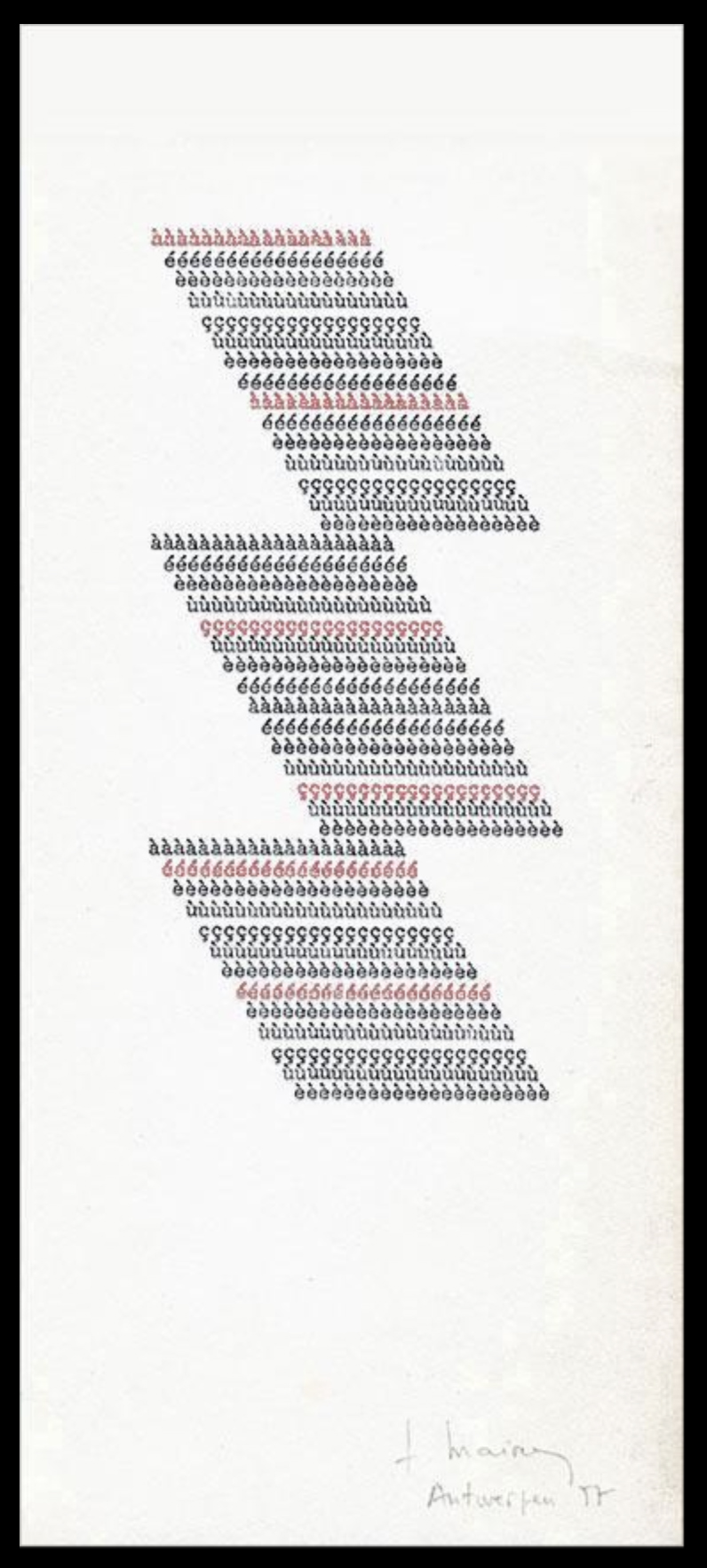
Words As Objects [a work in progress]
: :
Ongoing in various locations throughout 2024
Oluwatobiloba Ajayi
Annalisa Alloatti & Mirella Bentivoglio
Amanda Berenguer
Gary Canonne
Aimé Césaire
Furen Dai
Mirtha Dermisache
Eugen Gomringer
Theresa Hak Young Cha
Karl Holmqvist
Eric Li
Françoise Mairey
Sarah Maldoror
Jonah Mixon-Webster
Demetrius Oliver
N. H. Pritchard
Kim Reinhardt
and others TBD
I don’t sit down at a table to write poetry, or even a poem. What comes to mind first is a word, one word—and if there were one word that could contain all of myself then it would be enough, all by itself. Just one word, two words, a few words generate the poem and … carry it.
—Aimé Césaire
One of the less examined aspects of Marcel Broodthaers was his so called "position" regarding language, by which I mean who he thought he was, what he thought he was doing, and whom he thought he was doing it with. As a long-time poet turned visual artist, he never expressed any allegiance (nor was he critically aligned) with multiple poetry and visual art movements that emphasized the materiality of language, from Concrete Poetry to Neo Dada to Fluxus to Mail Art.
When Broodthaers was a poet he was a pretty conventional poet, and when he became a visual artist he was, at first, a pretty conventional artist as well. Only when his visual art took a linguistic turn did he begin to distinguish himself as an artist, and his use of language begin to align with the various language-based movements swirling around him. Indeed, several of Broodthaers' signature works share affinities with each: the Open Letters, the Coup de dés, and the Poèmes Industriels easily fit the rubrics of Mail Art, Fluxus, and Concrete Poetry respectively.
This avoidance is strange on its face: contrary to the evidence, an artist as invested in the material properties of language as Broodthaers was choosing not to align himself with such contemporaries as Nam June Paik, Robert Filiou or Françoise Mairey. Why?
A cynical take on Broodthaers' evasiveness might be that, having already spent twenty years consorting with surrealists, communists, poets, and journalists—not to mention dipping his toe into Happenings—he could see that there wasn't money in Concrete Poetry, Fluxus, or Mail Art either. It's more productive to think of Broodthaers' avoidance of these movements as a critique, or, more obliquely, as a way of calling their bluff, of course their "bluff" being the assertion that language is material and should be treated as such.
If ekphrasis is the genre of poetry that vividly describes works of art, then perhaps Broodthaers' position on language was to invent anekphrasis—a genre of art that vividly portrays the visuality of language. Having been a poet, and a lover of poetry, maybe all Broodthaers wanted to do as a visual artist was find ways to return the ekphrastic favor.
Ongoing in various locations throughout 2024
Oluwatobiloba Ajayi
Annalisa Alloatti & Mirella Bentivoglio
Amanda Berenguer
Gary Canonne
Aimé Césaire
Furen Dai
Mirtha Dermisache
Eugen Gomringer
Theresa Hak Young Cha
Karl Holmqvist
Eric Li
Françoise Mairey
Sarah Maldoror
Jonah Mixon-Webster
Demetrius Oliver
N. H. Pritchard
Kim Reinhardt
and others TBD
I don’t sit down at a table to write poetry, or even a poem. What comes to mind first is a word, one word—and if there were one word that could contain all of myself then it would be enough, all by itself. Just one word, two words, a few words generate the poem and … carry it.
—Aimé Césaire
One of the less examined aspects of Marcel Broodthaers was his so called "position" regarding language, by which I mean who he thought he was, what he thought he was doing, and whom he thought he was doing it with. As a long-time poet turned visual artist, he never expressed any allegiance (nor was he critically aligned) with multiple poetry and visual art movements that emphasized the materiality of language, from Concrete Poetry to Neo Dada to Fluxus to Mail Art.
When Broodthaers was a poet he was a pretty conventional poet, and when he became a visual artist he was, at first, a pretty conventional artist as well. Only when his visual art took a linguistic turn did he begin to distinguish himself as an artist, and his use of language begin to align with the various language-based movements swirling around him. Indeed, several of Broodthaers' signature works share affinities with each: the Open Letters, the Coup de dés, and the Poèmes Industriels easily fit the rubrics of Mail Art, Fluxus, and Concrete Poetry respectively.
This avoidance is strange on its face: contrary to the evidence, an artist as invested in the material properties of language as Broodthaers was choosing not to align himself with such contemporaries as Nam June Paik, Robert Filiou or Françoise Mairey. Why?
A cynical take on Broodthaers' evasiveness might be that, having already spent twenty years consorting with surrealists, communists, poets, and journalists—not to mention dipping his toe into Happenings—he could see that there wasn't money in Concrete Poetry, Fluxus, or Mail Art either. It's more productive to think of Broodthaers' avoidance of these movements as a critique, or, more obliquely, as a way of calling their bluff, of course their "bluff" being the assertion that language is material and should be treated as such.
If ekphrasis is the genre of poetry that vividly describes works of art, then perhaps Broodthaers' position on language was to invent anekphrasis—a genre of art that vividly portrays the visuality of language. Having been a poet, and a lover of poetry, maybe all Broodthaers wanted to do as a visual artist was find ways to return the ekphrastic favor.